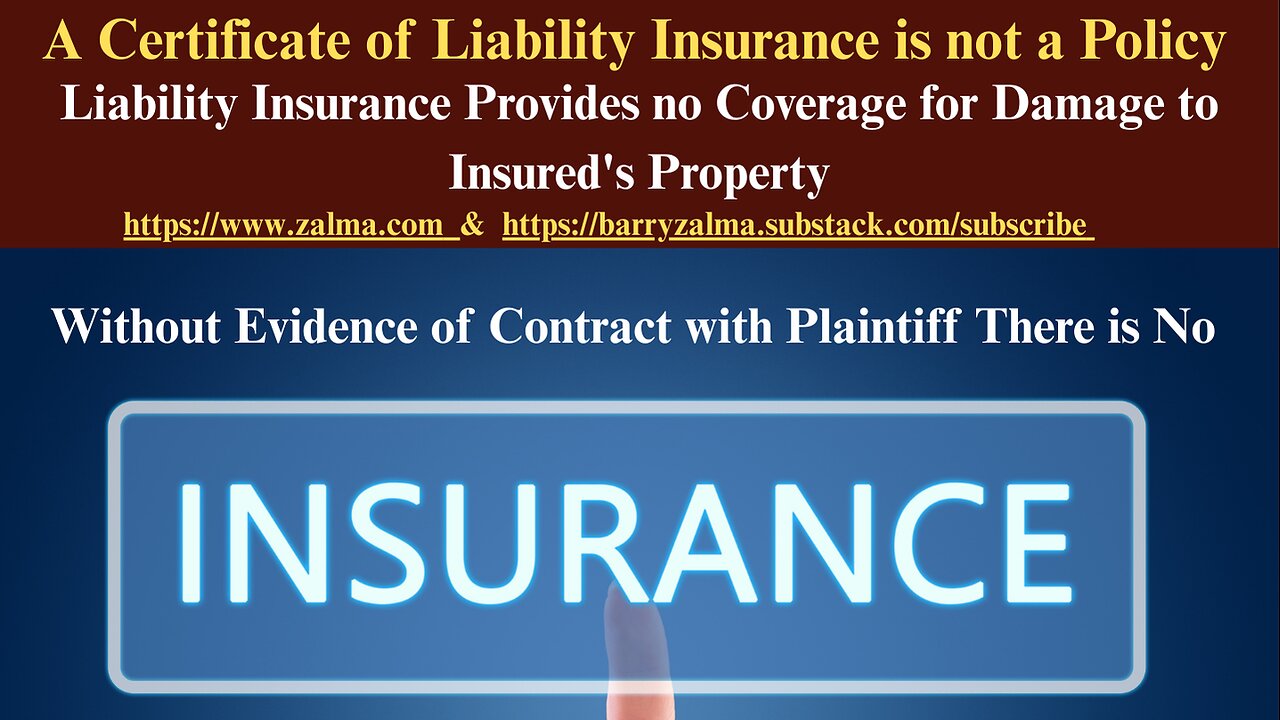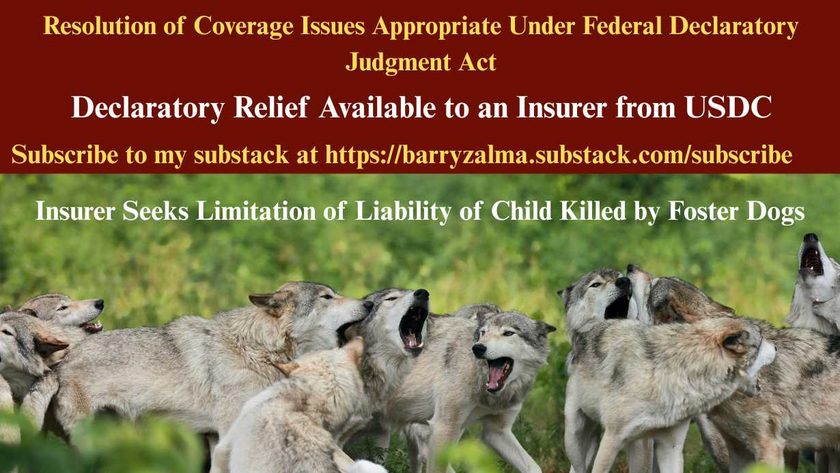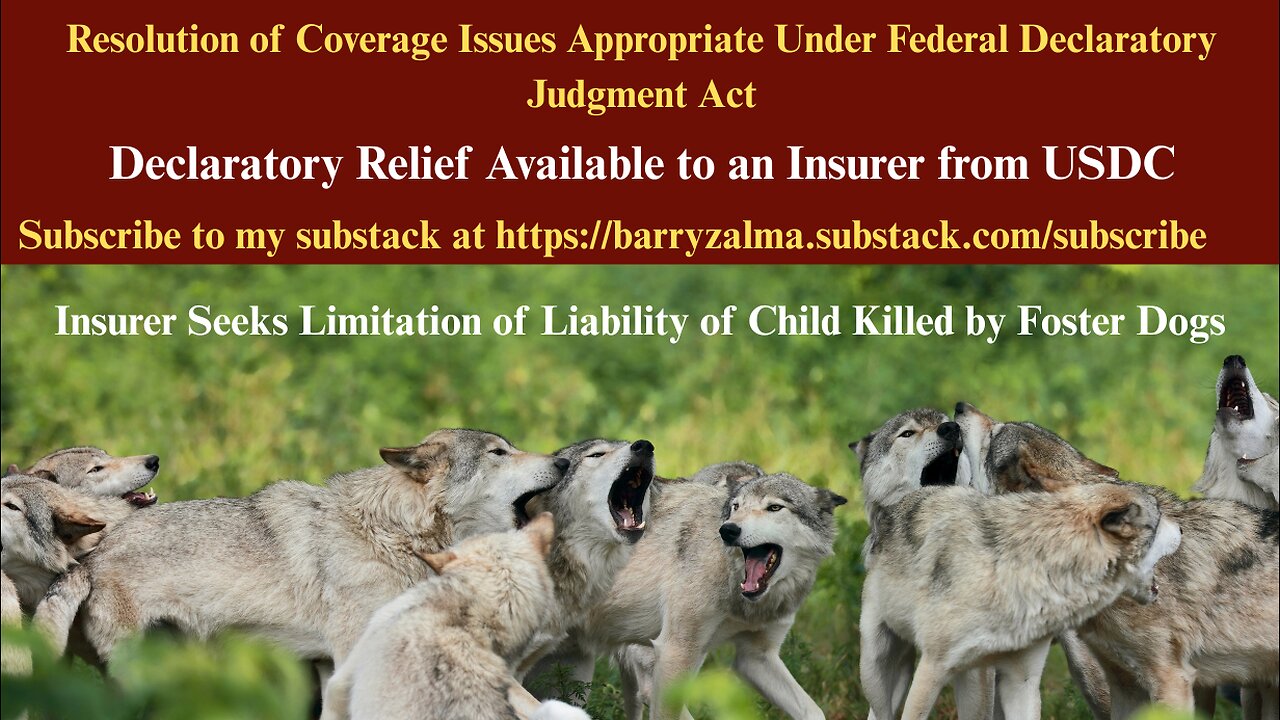
Business Pursuits Exclusion Defeats Claim
Barry Zalma
Read the full article at https://lnkd.in/gpfR_Mx2 and see the full video at https://lnkd.in/gCfgYqDw and at https://lnkd.in/gd9mH8ea and at https://zalma.com/blog plus more than 4450 posts.
In a declaratory judgment action to determine whether the plaintiffs were obligated to defend and indemnify the named defendant under certain insurance policies for damages awarded against the named defendant in a separate action, where the court denied the plaintiffs’ motion for summary judgment and granted the motion for summary judgment filed by the named defendant et al. as to the duty to defend under the policies. In Nationwide Mutual Insurance Company et. al. v. Jeffrey S. Pasiak et al., No. SC 20617, Supreme Court of Connecticut (February 21, 2023) Nationwide asked the Supreme Court to apply its business pursuits exclusion.
This case reached the Supreme Court for the second time following lengthy litigation of a declaratory judgment action brought by the plaintiffs, Nationwide Mutual Insurance Company and Nationwide Mutual Fire Insurance Company, against the defendant Jeffrey S. Pasiak. The action concerned whether the plaintiffs were obligated to indemnify the defendant, a business owner, under a personal umbrella insurance policy for liability arising from his false imprisonment of his company’s employee at her workplace.
The trial court rendered judgment for the plaintiffs, concluding that they have no obligation to indemnify the defendant. The defendant appealed.
FACTS
The defendant owned Pasiak Construction Services, LLC (Pasiak Construction), which had its sole office in the defendant’s home in Stamford. The defendant maintained a homeowners insurance policy and an umbrella insurance policy through the plaintiffs at the time of the incident. He did not hold any commercial liability insurance for his business.
Pasiak Construction employed Sara Socci as a part-time office manager with working hours of 9:30 a.m. to 2:30 p.m., four days per week. Socci worked out of the office in the defendant’s home and would help with both the defendant’s business tasks and personal tasks. One day in May, 2006, Socci was working at her desk when an individual entered the office wearing a mask and carrying a gun. The individual demanded that Socci show him to the defendant’s safe and open it. Socci had no knowledge of the safe or its combination. The individual became enraged, and he bound, gagged, and blindfolded Socci and forced her down on the floor of the bedroom. He put a gun to her head and told her he would kill her and her family if she did not open the safe.
The defendant eventually returned home and was attacked by the individual at the top of the stairs. The defendant was eventually able to unmask the individual, revealing his identity to be Richard Kotulsky, a longtime friend of the defendant. When the defendant asked about Socci’s whereabouts, Kotulsky led him to the bedroom, where the defendant made Kotulsky untie Socci. The defendant and Kotulsky reached some degree of resolution of their dispute and spoke amicably.
Despite Socci’s requests to leave, the defendant prevented her from leaving. Following Kotulsky’s exit, Socci resigned from Pasiak Construction and informed the defendant that she could no longer work for him because she was terrified that Kotulsky would return. The trial court also noted that she felt intimidated because the defendant and Kotulsky were each twice as large as she was.
Socci, her husband, and a friend later returned to the defendant’s home, at which point the defendant called the police. After being charged with kidnapping in the second degree and witness tampering, the defendant pleaded guilty under the Alford doctrine to charges of interfering with an officer and threatening in the second degree. Socci and her husband sued the defendant, alleging false imprisonment, negligence, intentional, reckless and negligent infliction of emotional distress, and loss of consortium. The plaintiffs provided the defendant with an attorney to defend him in the Socci action but notified him that they were reserving their right to contest coverage.
The plaintiffs then sued seeking a declaration that they had no duty to defend or indemnify the defendant in the Socci action. The trial court concluded, by way of summary judgment, that the allegations of the complaint were sufficiently broad to obligate the plaintiffs to provide the defendant with a defense under his homeowners and umbrella insurance policies, but the court deemed it improper, at that juncture, to determine the plaintiffs’ duty to indemnify.
Socci and the defendant proceeded to trial in the tort action, in which the jury awarded Socci $628,200 in compensatory damages and $175,000 in punitive damages. The jury also awarded Socci’s husband $32,500 in compensatory damages. The plaintiffs then filed a second motion for summary judgment in the declaratory judgment action regarding their duty to indemnify the defendant. The plaintiffs argued, among other things, that the defendant’s policies did not cover his liability for the Socci action because coverage was barred under the policy exclusion for business pursuits.
The court concluded that the plaintiffs were entitled to summary judgment under the homeowners insurance policy-which did not cover injury for emotional distress unless caused by a physical injury-but not under the umbrella insurance policy-which covered “personal injury,” defined to include false imprisonment.
The trial court issued a decision and rendered judgment for the defendant, requiring the plaintiffs to indemnify the defendant for his liability in the Socci action. The Supreme Court reversed the judgment of the Appellate Court with direction to remand the case to the trial court for a trial de novo on the business pursuits exclusion issue. The trial court concluded that the plaintiffs satisfied their burden by a preponderance of the evidence.
ANALYSIS
There is a distinction between the standard of proof in a civil trial and the interpretive presumptions the Supreme Court applies to insurance contracts. The interpretation of an insurance contract is “a question of law,” not a matter of fact.
No one questions that the activities of Pasiak Construction meet the two elements of a business pursuit. Nor does anyone contend that false imprisonment constitutes a business pursuit. Therefore, the question is whether the defendant’s false imprisonment of Socci arose out of his business pursuits in operating Pasiak Construction.
The Supreme Court concluded that it is sufficient to show only that the accident or injury was connected with, had its origins in, grew out of, flowed from, or was incident to the specified subject in order to meet the requirement that there be a causal relationship between the accident or injury and the subject.
The Supreme Court concluded that the defendant’s remaining claims were without merit, and the judgment of the trial court should be affirmed. Specifically, the Supreme Court concluded that:
1 the trial court did not err when it found in the plaintiffs’ favor on the basis that they failed to produce new, credible evidence that was not raised during the first trial, and
2 with respect to the second and third claims, the record, viewed as a whole, contains evidence that supports the factual findings of the trial court.
CONCLUSION
The trial court properly applied the preponderance of the evidence standard at the trial de novo to determine the factual question of whether the plaintiffs established that the business pursuits exclusion of the umbrella insurance policy barred coverage. It did, and the judgment was affirmed.
ZALMA OPINION
A construction company seeking insurance protection usually needs a commercial general liability (CGL) policy to protect its commercial interests. A homeowners policy, like that issued by Nationwide is designed to protect against the liability faced by a homeowner, not a business, and exclude coverage for business pursuits. In this case, as part of the defendant’s business a jury found he wrongfully imprisoned his employee and caused her and her husband tort damages. The exclusion applied and the insurer was not required to indemnify the insured although it was required to defend him to the allegations of the employee’s suit. The insured, Pasiak Construction, intentionally caused damage to an employee who was abused by a “friend” of Pasiak who held her at gunpoint and threatened to kill her and her family. Pasiak got more than he deserved with a full, paid for, defense. I expect Pasiak will file bankruptcy to avoid paying the judgment.
(c) 2023 Barry Zalma & ClaimSchool, Inc.
Subscribe and receive videos limited to subscribers of Excellence in Claims Handling at locals.com https://lnkd.in/gJm8mH_e
Follow Mr. Zalma on Twitter at https://twitter.com/bzalma; Go to Barry Zalma videos at Rumble.com at https://lnkd.in/gV9QJYH; Go to Barry Zalma on YouTube- https://lnkd.in/g2hGv88; Go to the Insurance Claims Library – https://lnkd.in/gWVSBde
Subscribe and receive videos limited to subscribers of Excellence in Claims Handling at locals.com https://zalmaoninsurance.locals.com/subscribe.
Go to substack at substack.com/refer/barryzalma Consider subscribing to my publications at substack at substack.com/refer/barryzalma
Barry Zalma, Esq., CFE, now limits his practice to service as an insurance consultant specializing in insurance coverage, insurance claims handling, insurance bad faith and insurance fraud almost equally for insurers and policyholders. He practiced law in California for more than 44 years as an insurance coverage and claims handling lawyer and more than 54 years in the insurance business. He is available at http://www.zalma.com and [email protected]
Write to Mr. Zalma at [email protected]; http://www.zalma.com; http://zalma.com/blog; daily articles are published at https://zalma.substack.com. Go to the podcast Zalma On Insurance at https://anchor.fm/barry-zalma; Follow Mr. Zalma on Twitter at https://twitter.com/bzalma; Go to Barry Zalma videos at Rumble.com at https://rumble.com/c/c-262921; Go to Barry Zalma on YouTube- https://www.youtube.com/channel/UCysiZklEtxZsSF9DfC0Expg; Go to the Insurance Claims Library – https://zalma.com/blog/insurance-claims-library
Not All Expert Testimony must be Scientifically Reliable
Post number 5284
Read the full article at https://lnkd.in/gcS7tWC8; see the video at https://lnkd.in/g7N27nuK and at https://lnkd.in/gcYh2sZG, and at https://zalma.com/blog plus more than 5250 posts.
In Church Mutual Insurance Company, S.I. v. Chabad Of New Mexico, No. 1:24-cv-00090-MIS-SCY, United States District Court, D. New Mexico (February 10, 2026) the USDC dealt with a declaratory judgment filed by Church Mutual that it owes no duty to cover Chabad’s claims because the property was “vacant” for more than sixty consecutive days before the acts of arson, and therefore no coverage is owed pursuant to the Policy’s “Vacancy” loss condition.
FACTUAL BACKGROUND
Church Mutual Insurance Company, S.I. (“Church Mutual”) renewed an insurance policy for Chabad of New Mexico (“Chabad”) covering real property in Rio Rancho, New Mexico. The policy included a “Vacancy” loss condition, stating that if the building was vacant for more than 60 ...
Liability Insurance Provides no Coverage for Damage to Insured’s Property
Post number 5283
Read the full article at https://www.linkedin.com/pulse/certificate-liability-insurance-policy-barry-zalma-esq-cfe-mteoc, see the video at and at and https://zalma.com/blog plus more than 5250 posts.
Evidence of Contract with Plaintiff There is No Insurance
In Erica T. Itzhak v. Briarwood Insurance Services Inc., Atlantic Casualty Insurance Co., 2026 NY Slip Op 00616, Appeal No. 5791, Index No. 651193/24, Case No. 2024-06530, Supreme Court of New York, First Department (February 10, 2026) Plaintiff Erica T. Itzhak alleged that her cooperative unit was damaged during a renovation. The complaint did not specify who caused the damage, nor did it clarify the relationships between the plaintiff, Atlantic Casualty Insurance Co., and Briarwood Insurance Services Inc., or provide details regarding which party was ...

UPCODING FRAUDSTER NEEDS TO PRODUCE DOCUMENTS DEMANDED
Post number 5282
Read the full article at https://www.linkedin.com/pulse/insurers-must-proactive-when-victims-fraud-barry-zalma-esq-cfe-07mpc, see the video at and at and at https://zalma.com/blog plus more than 5250 posts.
Insurance Fraud Can Be Stopped by Aggressive Insurers
In Unitedhealthcare Services, Inc., United Healthcare Insurance Co., and UMR, Inc. v. Team Health Holdings, Inc., Ameriteam Services, LLC, and HCFS Health Care Financial Services, Inc., No. 3:21-CV-364-DCLC-DCP, United States District Court, E.D. Tennessee, Knoxville (February 2, 2026) Plaintiffs are health insurance providers and claim administrators who process and pay approximately one million claims daily, relying on automated adjudication and truthful information from providers.
FACTUAL BACKGROUND
Defendants, including Team Health Holdings, Inc., Ameriteam Services, LLC,...

You Get What You Pay For – Less Coverage Means Lower Premium
Post number 5275
Posted on January 30, 2026 by Barry Zalma
See the video at and at
When Experts for Both Sides Agree That Two Causes Concur to Cause a Wall to Collapse Exclusion Applies
In Lido Hospitality, Inc. v. AIX Specialty Insurance Company, No. 1-24-1465, 2026 IL App (1st) 241465-U, Court of Appeals of Illinois (January 27, 2026) resolved the effect of an anti-concurrent cause exclusion to a loss with more than one cause.
Facts and Background
Lido Hospitality, Inc. operates the Lido Motel in Franklin Park, Illinois. In November 2020, a windstorm caused one of the motel’s brick veneer walls to collapse. At the time, Lido was insured under a policy issued by AIX Specialty Insurance Company which provided coverage for windstorm damage. However, the policy contained an exclusion for any loss or damage directly or indirectly resulting from ...


Declaratory Relief Available to an Insurer from USDC
Post number 5274
Read the full article at https://www.linkedin.com/pulse/resolution-coverage-issues-appropriate-under-federal-barry-wfpoc, see the video at and at and at https://zalma.com/blog plus more than 5250 posts.
Insurer Seeks Limitation of Liability of Child Killed by Foster Dogs
In the Cincinnati Specialty Underwriters Insurance Company, an Ohio corporation v. Dennis Murphy, as Personal Representative of the Wrongful Death Estate of Avery Colin Jackson-Dunphy, Deceased; Patrick Admiral Dunphy, an Individual; Danika Thompson, an Individual; and Animal Services Center Of The Messila Valley, a New Mexico limited Liability Company, No. CIV 24-1039 JB/JFR, United States District Court, D. New Mexico (January 23, 2026) resolved the issues raised about the court's jurisdiction.
Cincinnati Specialty Underwriters Insurance Company ...


Posted on January 26, 2026 by Barry Zalma
Insurance Fraud Should Not be a Retirement Plan
More from Excellence in Claims Handling Substack for Subscribers Only
You’re reading, until you reach the paywall, from the free part of Excellence in Claims Handling until you reach the paywall. You should consider joining as a paid member to get full access to articles for members only, to our news, analysis, insurance coverage, claims, insurance fraud and insurance webinars, by clicking at the “subscribe” button below.
Health Insurance Providers Are Attempting Insurance Fraud to Fund Retirement
Every insurer is required by its shareholders, members, state statutes and state regulations to do everything possible to deter and defeat attempts at insurance fraud. Most insurers, therefore, have a staff of fraud investigators working under their Special Investigative Unit (SIU) and the SIU works to train the claims handlers to recognize the indicators or red flags of fraud.
Much to the surprise of...














